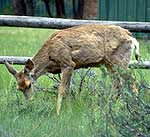By Erin Galbally
Minnesota Public Radio
August 7, 2002
As concern continues to rise about chronic wasting disease in deer, federal health authorities are investigating the deaths of three hunters in Wisconsin and Minnesota. The men, all friends, died in the 1990s from rare brain wasting diseases. They all regularly ate wild game including venison and elk meat. Now with the fall hunting season weeks away researchers and government officials are scrambling to try to determine whether chronic wasting disease poses health risks to humans.
| |
|
|
|
||
James Botts, Wayne Waterhouse, and Roger Marten were hunting buddies. They all died relatively young, victims of rare brain illnesses. It's only now as chronic wasting disease is spreading in Wisconsin's deer population that health officials are worried the three deaths may be more than a statistical fluke. As of right now researchers say they're still don't know if the deer disease can cross over to humans.
In Britain the cattle disease BSE, widely known as Mad Cow Disease, apparently did jump to humans. So far 115 people have died.
Greg Poland is a professor of infectious diseases at the Mayo Clinic. Poland says uncertainty about chronic wasting disease is unacceptable.
"We have to know," Poland says. " We have to know the extent of the problem. For officials to say we don't know of any cases is totally insufficient from a public health point of view."
Poland says the stakes are too high for government officials to take a wait and see approach. He says if it's proven humans can contract the disease by eating infected deer or elk meat, there are huge implications.
"If it's transmissible to humans now there are a whole flurry of issues that would need to be investigated," he says. "What implications does this have for the blood supply? What implications does this have for organ donation? It has epidemic potential."
Poland is distressed about what he sees as a lack of vigilance about looking for CWD in Minnesota. However, until the first case is identified in a specific area, finding the disease is complicated and expensive. Part of the problem in the Midwest is chronic wasting disease took Wisconsin by surprise. It's the first time the disease has turned up east of the Mississippi River.
Scientists agree that to effectively study chronic wasting disease in relation to humans they must know precisely where the disease exists. They also say human brain diseases must be given extra scrutiny in places where chronic wasting disease is detected.
Some humans in the United Kingdom who ate beef from animals with mad cow disease developed a specific form of Creutzfeldt-Jakob disease or CJD. CJD creates holes in the brain that eventually lead to death. In the British cases, the victims suffered from an unusual or variant form of the illness. That led scientists to trace the cause back to infected meat.
Pierluigi Gambetti runs the National Prion Pathology Surveillance Center at Case Western University in Ohio. So far Gambetti says he's only seen regular or common forms of CJD in the United States. He says that's a good thing.
"When it occurs it causes a variant CJD not the common CJD we see for example or the typical CJD we see in this country," explains Gambetti. "So far I've not seen a single case of variant CJD in the United States."
Gambetti says there are examples of other brain diseases that aren't transmissible to humans such as scrapie in sheep. He says that gives him hope that chronic wasting disease may turn out the same way. However he says doctors should be increasingly vigilant about brain diseases in humans as researchers try to find if there is a link with chronic wasting disease in deer.

